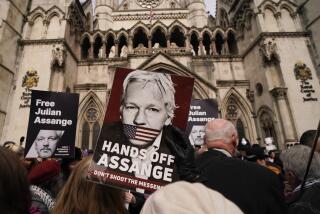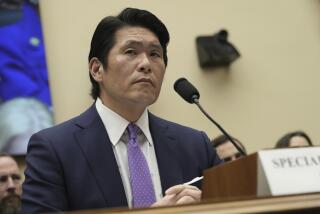Witness in WikiLeaks case says Manning confessed to him
A prosecution witness told a military judge Tuesday that an emotionally distraught Army Pfc. Bradley Manning confessed to him in encrypted Internet chats to pilfering a vast trove of U.S. military and diplomatic secrets and passing them to the WikiLeaks website.
The witness, Adrian Lamo, said he was so alarmed by his online conversations with Bradass87, Manning’s Internet handle, over five days in May 2010 that he felt compelled to alert law enforcement, prompting Manning’s arrest several days later.
“This person was admitting to acts so egregious that it required that response,” said Lamo, who confessed in 2004 to illegal computer hacking and was sentenced to 2 1/2 years’ probation.
The digital record of those online chats is crucial to the prosecution’s case against Manning, an Army intelligence analyst accused of illegally downloading more than half a million classified files and other material from a military computer network in a massive breach of national security.
Lamo testified for 75 minutes on the fifth day of a military hearing to determine whether Manning should face a court-martial. Prosecutors rested their case after Lamo stepped down. Defense lawyers will start calling witnesses Wednesday.
Manning faces 22 criminal charges, including aiding the enemy and violating the Espionage Act. If convicted, he could be sentenced to life in prison. He has pleaded not guilty.
The case against Manning hangs, in large part, on digital files, emails and chats that prosecutors say they recovered from his personal computer and other devices after he was arrested on May 29, 2010, at an Army base in Iraq. But Lamo’s testimony was perhaps the most damaging evidence to emerge so far.
Speaking in clipped, terse language, Lamo said he met Manning in the digital world after the intelligence analyst sent him an email introducing himself. Lamo suggested they chat over AOL Instant Messenger using encryption software called OTR, he said, and they were in contact from May 21 to May 26, 2010.
Lamo said he asked Manning about what files he had downloaded, how he did it and whether anyone had helped him. By the second day, Lamo testified, he was so troubled by Manning’s actions that he decided to call authorities.
Lamo became an unpaid confidential informant for Army criminal investigators, he said, and in July 2010 he led them to an Energy Department employee who allegedly tried to decode a classified video of a U.S. airstrike in Afghanistan that was handed to WikiLeaks.
Manning, 24, who has shown little emotion since the hearing began Friday, sighed audibly in his seat as Lamo spoke. He filled a page with scribbled notes, and once raised his hand in an apparent sign of frustration.
Under cross examination, Lamo told Manning’s defense lawyer, David E. Coombs, that he had pressed Manning for details out of concern for him.
“I am asking him in the network world in the same way someone in the physical world in a neighborhood might ask if they were lost or could help them,” Lamo said.
Asked whether Manning was seeking emotional support, Lamo said it was possible. “I do not believe they were looking for guidance so much as bragging about what they had done,” he added.
Lamo said he offered himself as a confessor because he is a minister in the Universal Life Church. The church website invites applicants to become ordained by filling out an online form.
Copies of the chats with Lamo show that Manning confided he was struggling with his sexual identity, had a troubled upbringing with an alcoholic father, and had downloaded classified State Department cables, Guantanamo Bay detainee files, Army battle reports, and videos of airstrikes in Iraq and Afghanistan.
Defense lawyers have sought to portray Manning as an emotionally troubled soldier, and argued that his supervisors ignored violent outbursts and other inappropriate behavior that should have led them to deny him access to classified material.
Army Spc. Jihrleah Showman, Manning’s supervisor during his training at Ft. Drum, N.Y., and later at Forward Operating Base Hammer in Iraq, described him as paranoid and volatile. But she said the Army needed intelligence analysts, and her supervisors rejected her recommendation that he not deploy to Iraq.
Once Manning arrived in Iraq, she said, his behavior grew more erratic. At one point, she testified, he flipped over a table and lunged for a rifle during an argument with another soldier.
Showman said she again advised her superiors that Manning might be a security risk, but they took no action. He was not removed from the classified computer room until he hit her in May 2010, shortly before his arrest.
“He punched me in the face unprovoked and displayed an uncontrollable behavior that was deemed untrustworthy at the time,” Showman testified. After that, she said, Manning was reassigned to the supply room.
Other prosecution witnesses testified that messages on Manning’s personal laptop computer indicated he could have communicated with WikiLeaks founder Julian Assange.
Mark Johnson, an Army forensic analyst, testified that Manning and a person he believed was Assange discussed sending and receiving “government information” and secret assessments of Guantanamo Bay detainees.
Johnson said Manning’s laptop was set up to transfer files to a Verizon Internet address registered to his aunt’s home in Maryland and a Swedish Internet service provider called PRQ, which has been affiliated with WikiLeaks.
A federal grand jury in Alexandria, Va., is hearing evidence in a separate investigation of Assange.
More to Read
Start your day right
Sign up for Essential California for news, features and recommendations from the L.A. Times and beyond in your inbox six days a week.
You may occasionally receive promotional content from the Los Angeles Times.







